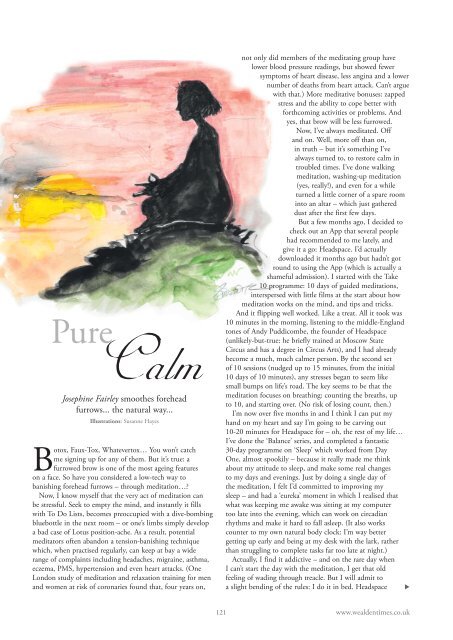Wealden Times | WT163 | September 2015 | Education supplement inside
Wealden Times - The lifestyle magazine for the Weald
Wealden Times - The lifestyle magazine for the Weald
Create successful ePaper yourself
Turn your PDF publications into a flip-book with our unique Google optimized e-Paper software.
Pure<br />
Calm<br />
Josephine Fairley smoothes forehead<br />
furrows... the natural way...<br />
Illustrations: Susanne Hayes<br />
Botox, Faux-Tox, Whatevertox… You won’t catch<br />
me signing up for any of them. But it’s true: a<br />
furrowed brow is one of the most ageing features<br />
on a face. So have you considered a low-tech way to<br />
banishing forehead furrows – through meditation…?<br />
Now, I know myself that the very act of meditation can<br />
be stressful. Seek to empty the mind, and instantly it fills<br />
with To Do Lists, becomes preoccupied with a dive-bombing<br />
bluebottle in the next room – or one’s limbs simply develop<br />
a bad case of Lotus position-ache. As a result, potential<br />
meditators often abandon a tension-banishing technique<br />
which, when practised regularly, can keep at bay a wide<br />
range of complaints including headaches, migraine, asthma,<br />
eczema, PMS, hypertension and even heart attacks. (One<br />
London study of meditation and relaxation training for men<br />
and women at risk of coronaries found that, four years on,<br />
not only did members of the meditating group have<br />
lower blood pressure readings, but showed fewer<br />
symptoms of heart disease, less angina and a lower<br />
number of deaths from heart attack. Can’t argue<br />
with that.) More meditative bonuses: zapped<br />
stress and the ability to cope better with<br />
forthcoming activities or problems. And<br />
yes, that brow will be less furrowed.<br />
Now, I’ve always meditated. Off<br />
and on. Well, more off than on,<br />
in truth – but it’s something I’ve<br />
always turned to, to restore calm in<br />
troubled times. I’ve done walking<br />
meditation, washing-up meditation<br />
(yes, really!), and even for a while<br />
turned a little corner of a spare room<br />
into an altar – which just gathered<br />
dust after the first few days.<br />
But a few months ago, I decided to<br />
check out an App that several people<br />
had recommended to me lately, and<br />
give it a go: Headspace. I’d actually<br />
downloaded it months ago but hadn’t got<br />
round to using the App (which is actually a<br />
shameful admission). I started with the Take<br />
10 programme: 10 days of guided meditations,<br />
interspersed with little films at the start about how<br />
meditation works on the mind, and tips and tricks.<br />
And it flipping well worked. Like a treat. All it took was<br />
10 minutes in the morning, listening to the middle-England<br />
tones of Andy Puddicombe, the founder of Headspace<br />
(unlikely-but-true: he briefly trained at Moscow State<br />
Circus and has a degree in Circus Arts), and I had already<br />
become a much, much calmer person. By the second set<br />
of 10 sessions (nudged up to 15 minutes, from the initial<br />
10 days of 10 minutes), any stresses began to seem like<br />
small bumps on life’s road. The key seems to be that the<br />
meditation focuses on breathing: counting the breaths, up<br />
to 10, and starting over. (No risk of losing count, then.)<br />
I’m now over five months in and I think I can put my<br />
hand on my heart and say I’m going to be carving out<br />
10-20 minutes for Headspace for – oh, the rest of my life…<br />
I’ve done the ‘Balance’ series, and completed a fantastic<br />
30-day programme on ‘Sleep’ which worked from Day<br />
One, almost spookily – because it really made me think<br />
about my attitude to sleep, and make some real changes<br />
to my days and evenings. Just by doing a single day of<br />
the meditation, I felt I’d committed to improving my<br />
sleep – and had a ‘eureka’ moment in which I realised that<br />
what was keeping me awake was sitting at my computer<br />
too late into the evening, which can work on circadian<br />
rhythms and make it hard to fall asleep. (It also works<br />
counter to my own natural body clock: I’m way better<br />
getting up early and being at my desk with the lark, rather<br />
than struggling to complete tasks far too late at night.)<br />
Actually, I find it addictive – and on the rare day when<br />
I can’t start the day with the meditation, I get that old<br />
feeling of wading through treacle. But I will admit to<br />
a slight bending of the rules: I do it in bed. Headspace <br />
121 www.wealdentimes.co.uk


















